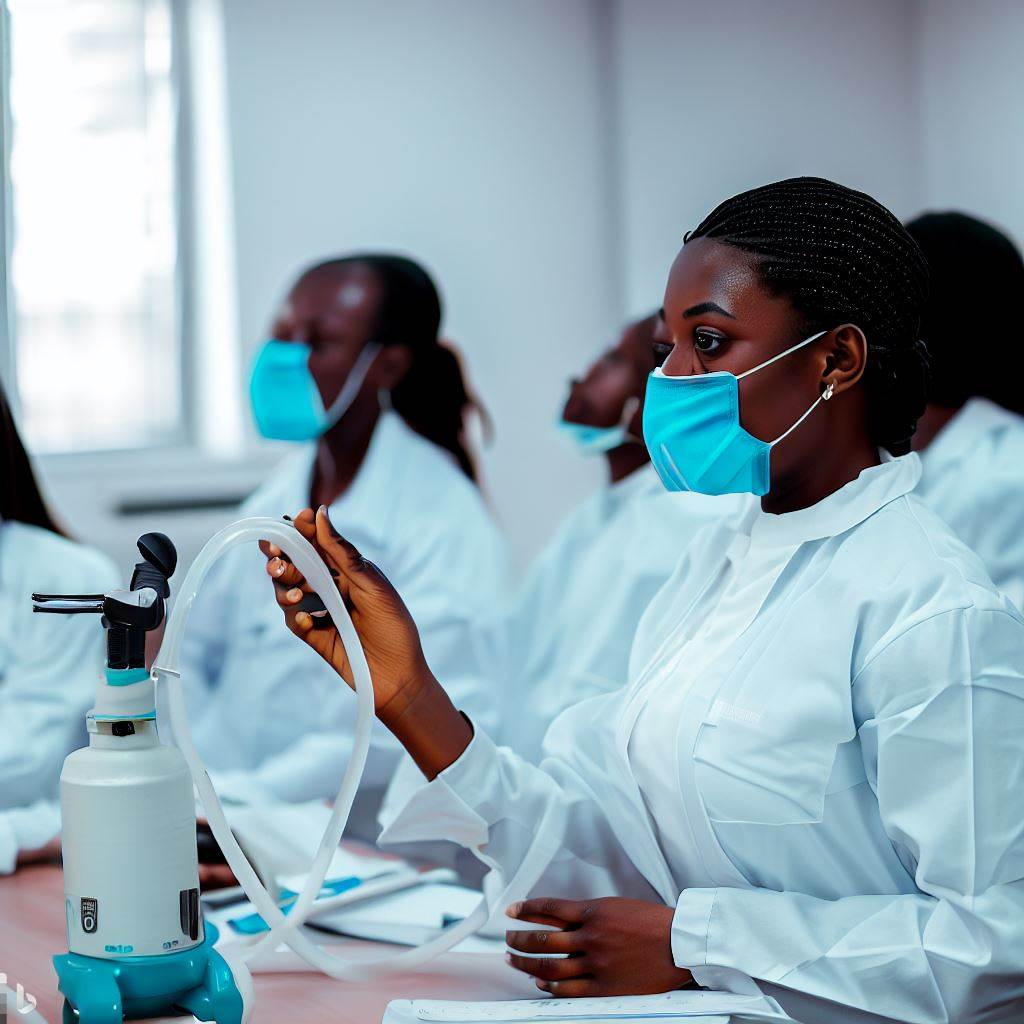Introduction
Importance of Respiratory Therapists in Healthcare
Respiratory therapists play a crucial role in the healthcare system, specializing in evaluating, treating, and managing patients with cardiopulmonary disorders.
They are essential members of the medical team, ensuring the proper functioning of the respiratory system and providing life-saving interventions for patients in need.
Brief Overview of the Challenges Faced by Respiratory Therapists in Nigeria
Nigeria, like many other developing countries, faces several challenges in the field of respiratory therapy.
Limited awareness about the profession and its importance often leads to a lack of recognition and support from both the public and healthcare system.
As a result, respiratory therapists in Nigeria struggle with inadequate resources, poor infrastructure, and insufficient training opportunities.
The scarcity of respiratory therapy programs in Nigerian universities restricts the number of professionals entering the field, intensifying the shortage of respiratory therapists and increasing the workload on existing practitioners.
Additionally, the limited availability of modern equipment and technologies hinders their ability to provide efficient and effective care.
Financial constraints further exacerbate the challenges faced by respiratory therapists in Nigeria.
With limited funding and low salaries, many professionals struggle to sustain their practice, affecting their motivation and commitment to the profession.
These financial hurdles also hinder their ability to participate in continuous education and professional development programs, limiting their knowledge and skills.
Generally, despite the crucial role respiratory therapists play in healthcare, they face a multitude of challenges in Nigeria.
The lack of awareness, limited resources, inadequate infrastructure, scarcity of professionals, and financial constraints all contribute to the difficulties faced by these dedicated healthcare providers.
Addressing these challenges is vital for improving the quality of respiratory care and ensuring the well-being of patients in Nigeria.
Lack of Awareness and Understanding
Despite the crucial role that respiratory therapists play in the healthcare system, there is a limited public knowledge about the profession in Nigeria.
Many people are unaware of the specialized training and expertise that respiratory therapists possess.
Furthermore, there are numerous misconceptions about the role and scope of respiratory therapists.
Some individuals mistakenly believe that their responsibilities are limited to administering oxygen, without understanding the broader range of treatments and interventions they provide to patients with respiratory conditions.
These misconceptions contribute to a lack of respect and recognition for respiratory therapists in Nigeria.
Their value in the healthcare team is often unrecognized, leading to difficulties in advocating for their profession and securing appropriate resources.
Addressing these challenges requires comprehensive and targeted educational campaigns to increase awareness and understanding.
Such campaigns should target both the general public and other healthcare professionals.
Effective strategies to improve awareness and understanding
- Organize public awareness programs to educate the community about respiratory therapy.
- Collaborate with media outlets to disseminate accurate information about the profession.
- Establish partnerships with educational institutions to include respiratory therapy in their curriculum.
- Engage in community outreach activities to directly interact with the public and address misconceptions.
- Provide resources and materials that clearly explain the roles and responsibilities of respiratory therapists.
By implementing these strategies, the awareness and understanding of respiratory therapy can be enhanced, leading to improved recognition and support for respiratory therapists in Nigeria.
It is important to emphasize the critical role that respiratory therapists play in the healthcare system. Their expertise in managing respiratory conditions is vital for the well-being and quality of life of patients.
Increasing awareness and understanding of respiratory therapy will also help attract more individuals to pursue this profession.
This, in turn, will contribute to the availability of skilled respiratory therapists in Nigeria, addressing the current shortage of professionals in this field.
In closing, the lack of awareness and understanding about respiratory therapy in Nigeria poses significant challenges for respiratory therapists.
These challenges can be overcome through effective educational campaigns that aim to increase public knowledge and dispel misconceptions.
By highlighting the importance of respiratory therapists and their specialized skills, we can create a healthcare system that fully values and supports this profession.
Limited availability of education and training programs
Respiratory therapists play a crucial role in the healthcare system, providing much-needed care and treatment for patients with breathing and cardiopulmonary disorders.
However, in Nigeria, these professionals face various challenges, particularly when it comes to education and training programs.
Insufficient number of accredited respiratory therapy schools in Nigeria
One of the major challenges facing respiratory therapists in Nigeria is the limited availability of accredited schools that offer respiratory therapy programs.
Currently, there are only a few institutions in the country that provide such training.
This scarcity of educational institutions puts aspiring respiratory therapists at a disadvantage, as they have fewer options to pursue their desired career path.
Limited access to schools means that only a limited number of students can be enrolled in respiratory therapy programs each year, resulting in a shortage of qualified professionals in the field.
Inadequate funding for the establishment and maintenance of new programs
Another significant challenge is the lack of adequate funding for the establishment and maintenance of new respiratory therapy programs.
Setting up a new educational institution requires significant financial investment, which is often unavailable or insufficient.
Without adequate funding, institutions struggle to provide the necessary resources, equipment, and faculty members to deliver quality education and training to aspiring respiratory therapists.
This can hinder the development of new programs and limit the number of students who can be enrolled each year.
Importance of expanding educational opportunities for aspiring respiratory therapists
The limited availability of education and training programs for respiratory therapists in Nigeria highlights the importance of expanding educational opportunities in this field.
By increasing the number of accredited respiratory therapy schools, more students can access quality education and training.
Expanding educational opportunities will not only address the shortage of respiratory therapists but also enhance the overall quality of healthcare in the country.
With a larger pool of qualified professionals, there will be improved patient care, better outcomes, and a more efficient healthcare system.
Furthermore, expanding programs can create job opportunities for both aspiring respiratory therapists and experienced professionals looking to further their education.
This can stimulate economic growth and contribute to the overall development of the healthcare sector in Nigeria.
In general, respiratory therapists in Nigeria face significant challenges due to the limited availability of education and training programs.
The insufficient number of accredited schools and inadequate funding for new programs hinder the development and accessibility of quality respiratory therapy education.
However, it is crucial to recognize the importance of expanding educational opportunities for aspiring respiratory therapists.
By doing so, Nigeria can address the shortage of qualified professionals, improve patient care, and contribute to the overall growth of the healthcare sector.
Read: The Path to Becoming a Surgeon in Nigeria
Shortage of Qualified Respiratory Therapists
Small pool of trained respiratory therapists to meet the increasing demand
In Nigeria, there is a pressing challenge of a scarcity of qualified respiratory therapists.
The number of trained professionals in this field is insufficient to meet the growing demand for their services.
The lack of a substantial pool of trained respiratory therapists means that patients who require specialized respiratory care often face delays in receiving the treatment they need.
This can have detrimental consequences for patients with respiratory illnesses.
The shortage of qualified respiratory therapists is largely due to the limited educational and training opportunities available in Nigeria.
There is a need for more universities and training institutions to offer programs in respiratory therapy to increase the number of qualified professionals in the country.
Difficulty in attracting and retaining skilled professionals in the field
Another significant challenge facing respiratory therapists in Nigeria is the difficulty in attracting and retaining skilled professionals.
Many respiratory therapists choose to leave the country in search of better career prospects and working conditions.
The inadequate salary structure and lack of opportunities for career advancement in Nigeria contribute to the challenge of retaining skilled respiratory therapists.
The healthcare sector needs to develop competitive remuneration packages and provide opportunities for professional growth to incentivize respiratory therapists to stay in the country.
In addition, there is a need to improve working conditions and provide a supportive and conducive environment for respiratory therapists.
This includes ensuring access to necessary medical equipment, proper training, and a safe workplace.
Strategies for recruiting and retaining respiratory therapists in Nigeria
Addressing the shortage of qualified respiratory therapists in Nigeria requires strategic efforts in recruitment and retention. The following strategies can help attract and retain skilled professionals in the field:
- Increasing the number of educational institutions offering respiratory therapy programs to expand the pool of trained professionals.
- Providing competitive salaries and benefits to respiratory therapists to match global standards and retain them in Nigeria.
- Developing professional advancement opportunities and career development programs to encourage respiratory therapists to stay and grow within the country.
- Creating a supportive and safe working environment for respiratory therapists, including access to necessary resources and equipment.
- Collaborating with international organizations and experts to provide training and mentorship programs for respiratory therapists in Nigeria.
By implementing these strategies, Nigeria can work towards addressing the shortage of qualified respiratory therapists and ensuring access to quality respiratory care for its population.
It requires a comprehensive and collaborative effort from government bodies, healthcare institutions, and educational organizations to overcome these challenges and improve the respiratory healthcare system in the country.
Read: Career Advancement Opportunities for Nigerian Respiratory Therapists

Inadequate Equipment and Resources
Lack of modern respiratory therapy equipment in healthcare facilities
In Nigeria, respiratory therapists face significant challenges due to the lack of modern respiratory therapy equipment in healthcare facilities.
This hinders their ability to provide high-quality care to patients with respiratory disorders.
The outdated equipment often available in these facilities limits the effectiveness of therapies and interventions, making it difficult for the therapists to achieve optimal outcomes.
This not only affects the quality of care but also puts patients at risk.
Limited access to necessary resources for respiratory therapy practices
In addition to the lack of modern equipment, respiratory therapists also struggle with limited access to necessary resources for their practices.
This includes essential supplies, medications, and educational materials.
Without these resources, therapists find it challenging to deliver appropriate care and keep up with the latest advancements in respiratory therapy.
They are unable to provide patients with the best possible treatments and may have to resort to suboptimal alternatives.
Importance of government and private sector investment in upgrading facilities
To address these challenges, it is crucial for both the government and private sector to invest in upgrading healthcare facilities and providing adequate resources for respiratory therapy practices.
The government should allocate funds for the procurement of modern respiratory therapy equipment, ensuring that healthcare facilities are well-equipped to handle respiratory disorders effectively.
Additionally, collaboration with the private sector can help secure financial support and expertise in upgrading facilities.
This partnership can facilitate the availability of necessary resources and contribute to improving the overall respiratory care system in Nigeria.
In fact, respiratory therapists in Nigeria face significant challenges due to inadequate equipment and resources.
The lack of modern respiratory therapy equipment in healthcare facilities limits their ability to deliver high-quality care. Limited access to necessary resources further exacerbates these challenges.
Therefore, it is crucial for the government and private sector to invest in upgrading facilities and providing the necessary resources.
By doing so, they can ensure that respiratory therapists have the tools and support they need to deliver optimal care and improve the overall respiratory care system in Nigeria.
Read: Understanding the Role of a Nigerian Respiratory Therapist
COVID-19 Pandemic and its Impact
Surge in demand for respiratory therapists due to the pandemic
The COVID-19 pandemic has created an unprecedented demand for respiratory therapists in Nigeria.
With the increasing number of cases, the need for skilled professionals to manage respiratory complications has become paramount.
Hospitals and healthcare facilities have had to rapidly expand their respiratory care teams to cope with the surge.
Challenges faced by respiratory therapists in managing COVID-19 cases
Respiratory therapists in Nigeria have faced numerous challenges in the management of COVID-19 cases.
The scarcity of personal protective equipment (PPE) has put their safety at risk.
Limited access to testing and diagnostic tools has made it difficult to accurately identify and monitor patients.
Additionally, the lack of properly equipped isolation wards has further strained the ability of respiratory therapists to deliver effective care.
Lessons learned and recommendations for future preparedness
The COVID-19 pandemic has highlighted the need for improved preparedness and resources for respiratory therapists in Nigeria.
To ensure better handling of future outbreaks, several lessons must be learned:
- Investment in training and education: Respiratory therapists should receive specialized training on infectious diseases and pandemic management to enhance their skills and knowledge in handling such situations.
- Upgrade in healthcare infrastructure: The Nigerian government should prioritize the improvement of healthcare infrastructure, including the establishment of well-equipped isolation wards and the availability of necessary equipment and supplies.
- Strengthening of supply chains: Efforts must be made to ensure the availability and supply of PPE, testing kits, and other necessary materials to protect respiratory therapists and enable them to provide safe and quality care.
- Establishment of a national registry: Creating a national registry for respiratory therapists would help in better resource allocation, tracking of available professionals, and improvement of collaboration among healthcare facilities.
- Research and data collection: It is important to invest in research and data collection to understand the prevalence and impact of respiratory diseases in Nigeria. This will aid in making informed decisions and developing effective strategies for prevention and management.
In short, the COVID-19 pandemic has presented significant challenges for respiratory therapists in Nigeria.
However, by learning from these experiences and implementing the recommended measures, the healthcare system can be better prepared to tackle future outbreaks effectively.
The role of respiratory therapists in managing respiratory health is of utmost importance, and their contribution should not be overlooked.
Read: Becoming a Phlebotomist in Nigeria: Steps and Requirements
Need for Government Support and Policy Changes
Importance of government recognition and support for the profession
- Government recognition is crucial for the advancement and growth of respiratory therapy in Nigeria.
- Respiratory therapists need government support to establish standardized training programs and regulations.
- Without government recognition, respiratory therapists face challenges in gaining professional legitimacy and acceptance.
- Government support can lead to increased employment opportunities for respiratory therapists in public healthcare facilities.
- Recognition by the government also ensures that respiratory therapists are eligible for government-sponsored professional development programs.
Advocacy for policy changes to improve the working conditions of respiratory therapists
- Policies should be implemented to improve the working conditions and overall welfare of respiratory therapists.
- Respiratory therapists often face long working hours and inadequate rest breaks, which can negatively impact patient care.
- The government should regulate the ratio of respiratory therapists to patients to ensure quality care and prevent burnout.
- Policy changes should also address issues such as the provision of necessary equipment and resources for respiratory therapy.
- Advocacy efforts should focus on the inclusion of respiratory therapists in decision-making processes concerning healthcare policies.
Collaborations between professional organizations and the government for progress
- Collaborations between professional organizations and the government are vital in advancing the field of respiratory therapy.
- Professional organizations can serve as advocates for respiratory therapists, pushing for policy changes and improved working conditions.
- Through partnerships, professional organizations can provide the government with valuable insights and recommendations for policy development.
- Collaborative efforts can lead to the establishment of accreditation bodies to ensure high-quality respiratory therapy education programs.
- By working together, professional organizations and the government can create a conducive environment for the practice of respiratory therapy in Nigeria.
In summary, the need for government support and policy changes is imperative for respiratory therapists in Nigeria.
Recognition and support from the government are essential for the growth and professional legitimacy of the field.
Advocacy for policy changes can lead to improved working conditions and better patient care.
Collaborations between professional organizations and the government are crucial for progress and the establishment of standards.
It is through these collective efforts that respiratory therapy can thrive and contribute to the healthcare system in Nigeria.
Read: Cultural Competency for Pharmacy Technicians in Nigeria.
Conclusion
Recap of the challenges faced by respiratory therapists in Nigeria
- Lack of recognition and awareness about the profession
- Inadequate training and education opportunities
- Limited resources and equipment
- Low salaries and inadequate career growth
Call to action for addressing these challenges and supporting respiratory therapy profession
- Government support and funding for respiratory therapy programs
- Collaboration with international organizations to improve training and education
- Advocacy for increased recognition and awareness of respiratory therapy
- Improvement in working conditions and salaries for respiratory therapists
Hope for a brighter future for respiratory therapists in Nigeria
Despite the challenges, there is optimism for the future as respiratory therapy gains more recognition and support in Nigeria.
With concerted efforts from all stakeholders, these challenges can be overcome, and respiratory therapists in Nigeria can thrive in their profession.
It is crucial for the government, healthcare institutions, and the public to realize the importance of respiratory therapy in improving the quality of healthcare in Nigeria.
By addressing the challenges and providing the necessary support, Nigeria can build a strong respiratory therapy workforce and ensure a healthier future for its citizens.




